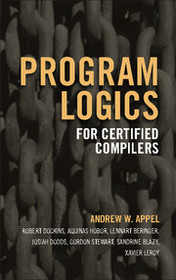
Program Logics for Certified Compilers
- Publisher's listprice GBP 83.00
-
39 653 Ft (37 765 Ft + 5% VAT)
The price is estimated because at the time of ordering we do not know what conversion rates will apply to HUF / product currency when the book arrives. In case HUF is weaker, the price increases slightly, in case HUF is stronger, the price goes lower slightly.
- Discount 10% (cc. 3 965 Ft off)
- Discounted price 35 688 Ft (33 989 Ft + 5% VAT)
Subcribe now and take benefit of a favourable price.
Subscribe
39 653 Ft

Availability
Estimated delivery time: In stock at the publisher, but not at Prospero's office. Delivery time approx. 3-5 weeks.
Not in stock at Prospero.
Why don't you give exact delivery time?
Delivery time is estimated on our previous experiences. We give estimations only, because we order from outside Hungary, and the delivery time mainly depends on how quickly the publisher supplies the book. Faster or slower deliveries both happen, but we do our best to supply as quickly as possible.
Product details:
- Publisher Cambridge University Press
- Date of Publication 21 April 2014
- ISBN 9781107048010
- Binding Hardback
- No. of pages472 pages
- Size 231x150x25 mm
- Weight 750 g
- Language English
- Illustrations 52 b/w illus. 0
Categories
Short description:
This tutorial for graduate students covers practical and theoretical aspects of separation logic with constructions and proofs in Coq.
MoreLong description:
Separation logic is the twenty-first-century variant of Hoare logic that permits verification of pointer-manipulating programs. This book covers practical and theoretical aspects of separation logic at a level accessible to beginning graduate students interested in software verification. On the practical side it offers an introduction to verification in Hoare and separation logics, simple case studies for toy languages, and the Verifiable C program logic for the C programming language. On the theoretical side it presents separation algebras as models of separation logics; step-indexed models of higher-order logical features for higher-order programs; indirection theory for constructing step-indexed separation algebras; tree-shares as models for shared ownership; and the semantic construction (and soundness proof) of Verifiable C. In addition, the book covers several aspects of the CompCert verified C compiler, and its connection to foundationally verified software analysis tools. All constructions and proofs are made rigorous and accessible in the Coq developments of the open-source Verified Software Toolchain.
MoreTable of Contents:
1. Introduction; Part I. Generic Separation Logic: 2. Hoare logic; 3. Separation logic; 4. Soundness of Hoare logic; 5. Mechanized semantic library Andrew W. Appel, Robert Dockins and Aquinas Hobor; 6. Separation algebras; 7. Operators on separation algebras; 8. First-order separation logic; 9. A little case study; 10. Covariant recursive predicates; 11. Share accounting; Part II. Higher-Order Separation Logic: 12. Separation logic as a logic; 13. From separation algebras to separation logic; 14. Simplification by rewriting; 15. Introduction to step-indexing; 16. Predicate implication and subtyping; 17. General recursive predicates; 18. Case study: separation logic with first-class functions; 19. Data structures in indirection theory; 20. Applying higher-order separation logic; 21. Lifted separation logics; Part III. Separation Logic for CompCert: 22. Verifiable C; 23. Expressions, values, and assertions; 24. The VST separation logic for C light; 25. Typechecking for Verifiable C Josiah Dodds; 26. Derived rules and proof automation for C light; 27. Proof of a program; 28. More C programs; 29. Dependently typed C programs; 30. Concurrent separation logic; Part IV. Operational Semantics of CompCert: 31. CompCert; 32. The CompCert memory model Xavier Leroy, Andrew W. Appel, Sandrine Blazy and Gordon Stewart; 33. How to specify a compiler Lennart Beringer, Robert Dockins and Gordon Stewart; 34. C light operational semantics; Part V. Higher-Order Semantic Models: 35. Indirection theory Aquinas Hobor, Andrew Appel and Robert Dockins; 36. Case study: lambda-calculus with references; 37. Higher-order Hoare logic; 38. Higher-order separation logic; 39. Semantic models of predicates-in-the-heap; Part VI. Semantic Model and Soundness of Verifiable C: 40. Separation algebra for CompCert; 41. Share models; 42. Juicy memories Gordon Stewart and Andrew W. Appel; 43. Modeling the Hoare judgment; 44. Semantic model of CSL; 45. Modular structure of the development; Part VII. Applications: 46. Foundational static analysis; 47. Heap theorem prover Gordon Stewart, Lennart Beringer and Andrew W. Appel.
More



